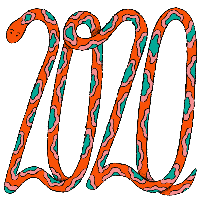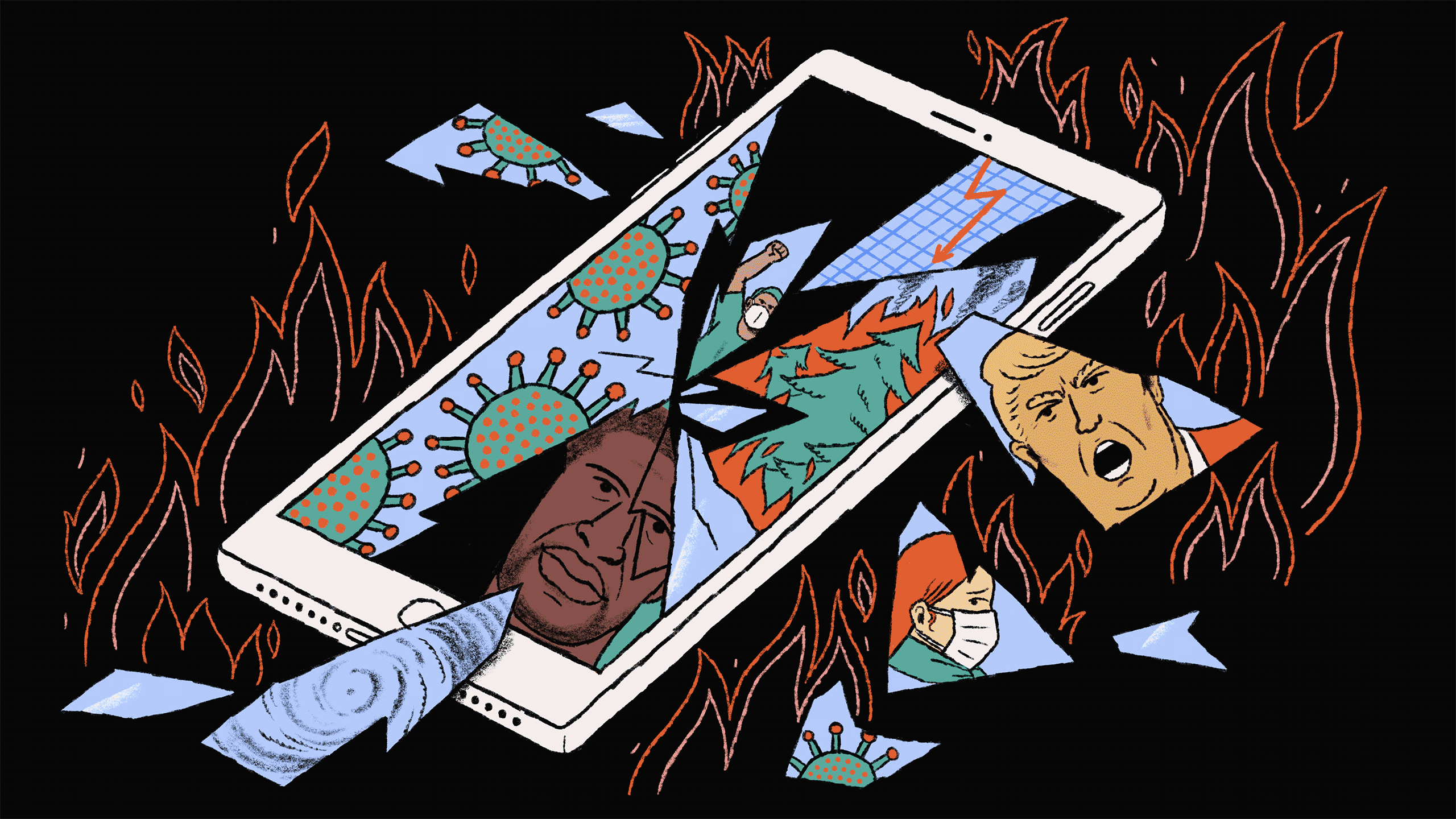What tone can one possibly strike for an overview of 2020? The Queen’s old label of annus horribilis for her own most troubled time hardly seems adequate. Even the right point of view is hard to decide on. Does it make more sense to see the year from high above, taking a picture of an entire panicked planet, or to start from the ant’s- or worm’s-eye view, with the transformation of our manners and minds by the strangeness of 2020 (and by its sadness, too)? Begin with the scale of the misery and dislocation? Narrow down to the specific sensory strangeness of the year?
Seeing the scale first is useful because it’s so unparalleled: not one city, or even one country, but everywhere at once. Paris shut down and the first silent nights in its history enforced, with Parisians carrying permission slips like schoolchildren just to go to a pharmacy. London under lockdown, Times Square in quarantine, dressed in ghost-town array. “A quiet capital is a contradiction in terms,” the great Max Beerbohm wrote during the London bombing. “It is a thing uncanny, spectral.” And yet, uncanny though it might be, the imagery of an actual pandemic is, truth be told, considerably less melodramatic than the cinematic version. Often, when we call something “unimaginable,” what we really mean is more like “too oft imagined.” We actually have been here before, in every pandemic movie, in that Will Smith one with the zombies, for instance—and, in the zombie movie, the people are slavering in the streets. In the real one, the streets are merely empty.
New Yorker writers reflect on the year’s highs and lows.

The sensory specifics are all that usually matter, or linger, in history. Read Daniel Defoe on the mid-seventeenth-century plague in London, and it is the inventory of specific people and places—how the bear-baiting pits got shut down—that is most memorable. Let’s mark down some new sensory experiences, which our descendants might find hard to credit. The feel of a mask against a face, for instance, a sensation regularly known among Americans, previously, only to a population of doctors and nurses, became a universal—though, tragically, not universal enough—sensation. The formerly unfamiliar smell of one’s own nose, the two anchoring strings pressed behind the ears, vanishing from consciousness as a sensory pressure over the day, returning only when, in an absent-minded moment, we might forget to put it on—when, walking outside, the wearer feels utterly naked, exposed, without it.
And along with that comes the elaborate pantomime of masking: the shocking and newly learned truth that—for the most part, for most people—masks in fact don’t disguise and that all those Hollywood bandits, robbing banks in old cowboy movies, were concealing . . . nothing. We rarely fail to recognize a friend behind a mask; the “Così Fan Tutte”-style misunderstandings that masking is supposed to produce almost never happen. Instead, our astounding innate gift for facial recognition, long studied by the psychologist Susan Carey and her colleagues, has been vindicated: even broken data give us enough information to make a set of eyebrows and the turn of a head instantly recognizable as a unique person.
There is the accompanying pitiful pantomime of immunity, sometimes comic and sometimes sad. In the outdoor pavement café, that perverse gift of the pandemic, the masks stay on through the act of ordering and then come off gaily the moment the food arrives, as though the virus halts in midair politely, like the reversible bullets in a cartoon. And then there is the comedy of indoors and outdoors, as “outdoor” dining became acceptable in what were, as the fall wore into winter, huts and sheds that looked suspiciously like indoor dining. If it has walls and a roof and is shut off from the street, surely that counts as indoors—or at least reminds us that all we call “indoors” is actually outdoors, with walls drawn around it for a time.
To take a midway view, halfway between the overhead and closeup points, people who live in New York City, Philadelphia, Oakland, and elsewhere can pause a moment and recall, before their memory is eradicated by the next strange thing, the Weeks of the Mysterious Fireworks. The history book that someone will write a century from now about 2020 might well begin there, in late June and early July, with the sinister summer-long explosion of inexplicable fireworks long past midnight, seeding sleepless nights and countless conspiracy theories. The fireworks were intertwined with the most passionate weeks of the Black Lives Matter protests that filled streets and pointed truths then, and it was not impossible to understand why the belief became current that the fireworks had been deliberately passed out by the authorities in order to do something invidious: perhaps to habituate people to noise in preparation for military operations, or perhaps merely to attenuate nerves on behalf of a paranoid police force.
Horror follows horror, and unease comes after unease. The experience of the pandemic was made ghastlier by being placed against the declension of Trumpism from evil to absurdity—who will ever forget Four Seasons Total Landscaping?—and then back into even darker evil again. Philip K. Dick is the only author who could match the monstrous improbability of the protagonist, this oafish orange showman, who incarnates every hypocrisy known to man, for this combination of grotesque carnival and incipient fascism, in a farce-nightmare of authoritarianism as a reality show.
Throughout the year, nothing was normal, and everything seemed normalized. Kids spending their days staring at screens—and their parents now encouraging them to do it, for their own good! Stark inequality not just already in place but driven ever more forward, pushing women out of work, depressing many businesses and devastating some, in retail and the restaurant business particularly, perhaps beyond repair. Above all, more than a million people dead, and millions sickened, by a suddenly arrived virus as violent as it was mysterious. Yet “normalized” is an ugly word, and inadequate to the experience of 2020. We haven’t normalized things we never expected to face; rather, we’ve accepted them, and the idea of acceptance, as both an enduring spiritual virtue and as a dubious, fatalistic practice, wraps itself this year around both the pain we shared and our efforts to transcend it.
Add one more element to the ominous mix: all summer long, two strangely glowing planets glowered down on us, presiding over the strangeness. Jupiter and Saturn, unusually bright and vivid, were approaching what astronomers call their “great conjunction”; as this year ended, they were seen closer together than they have appeared in eight hundred years, so near as to form one peculiar, double Christmas star. You can read Defoe to know what an earlier age would have made of such an enormous astrological portent. It would have explained everything in one nightly array.
And yet, in the end, smaller lights of reason shone. A majority of American voters rejected Trumpism, including a small but crucial margin of former Trump voters. Millions and millions more Americans voted against Trump than for him. Reason—and the science it inspires—really does look sturdier at year’s tragic end than it did before. The fireworks, we have since learned, went off not because of any covert conspiracy but because the ‘opportunity costs’ of fireworks, as one economist put it, suddenly became much lower; opportunity costs “put a dollar value on what else a person could do with their time,” and in the height of the pandemic in summer there just wasn’t enough else to do. The fireworks happened for homespun economic reasons. Whenever the kinds of conspiracy theories that Trump thrives on met tests of truth and evidence, in the courts or in the lab, they failed, miserably and abjectly. The vaccine that may at least ease the crisis was the result of processes of biological science that have been ripening now for decades and came to the rescue because they had been slowly nurtured, in labs and classrooms, for so long. A refusal to accept things as they are and a furious attachment to ongoing life proved stronger than either detachment or resignation—minimally stronger, perhaps, but minimal is often the best we can hope for.
Conjunctions, great and small, in sentences as in the skies, connect the dots of common speech, or of stars. Conjunctions can glue us together or push us apart. We write the world as much as we get written by it. The best point of view with which to see even a year as strange as this one is neither from above nor from below but face to face, eye to eye, that human point of view which persists, even when, for a time, it must go masked.
2020 in Review
- The top twenty-five New Yorker stories.
- The funniest New Yorker cartoons, as chosen by our Instagram followers.
- Helen Rosner on the best cookbooks.
- Doreen St. Félix selects the best TV shows.
- Richard Brody lists his top thirty-six movies.
- Ian Crouch recounts the best jokes of the year.
- Sheldon Pearce on the albums that helped him navigate a lost plague year.
- Sarah Larson picks the best podcasts.
- New Yorker writers on the best books they read this year.

